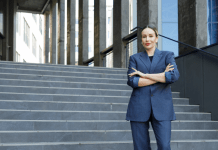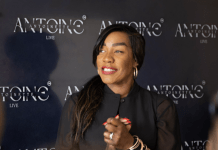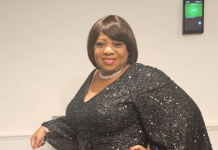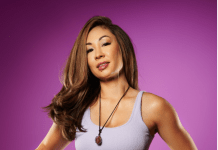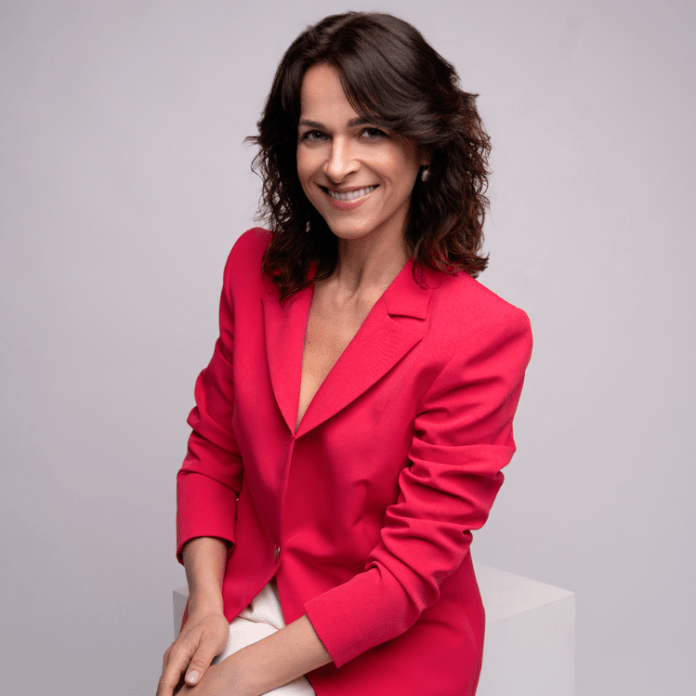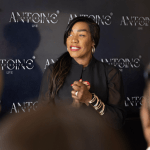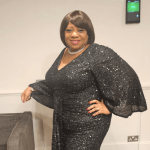Annalisa Corti knows what it means to hold many worlds at once—student, professional, mother, leader—and to turn apparent chaos into clarity. From graduating with top marks while working multiple jobs, to managing complex international projects, she proved early on that discipline and focus can achieve what others call impossible. But her real breakthrough came when she discovered that efficiency isn’t about squeezing more into the day—it’s about mastering the way you show up in every moment.
Today, as a business coach and personal efficiency specialist, Annalisa helps entrepreneurs and leaders strip away the noise, regulate their energy, and align strategy with presence. Her work goes beyond productivity hacks; it’s about building businesses and lives that are sustainable, intentional, and deeply fulfilling. In a culture addicted to hustle, she offers a rare alternative: success built on clarity, calm, and inner strength.
What inspired you to become a personal efficiency specialist and business coach?
Order and efficiency have been second nature to me since childhood. Even as a little girl, I instinctively looked for the fastest, most effective way to do things—whether it was setting up a game, mapping a treasure hunt, or organizing friends. That mindset carried into my studies: in college, I maintained a 3.9 average, worked three jobs, trained at the gym, and still had a buzzing social life. It wasn’t about “doing it all,” but about having a clear method to prioritize, focus, and stay consistent.
When I entered the professional world, I quickly noticed that I could produce twice as much as those around me simply because I had a system. That ability propelled me forward in international development and gave me a solid foundation in leadership and execution.
In 2016, a series of coincidences led me to leave project management and step into the world of business growth. What I loved was the concreteness of it: the ability to help a business create real impact in the market and in people’s lives. Very soon, I realized something crucial—business results always mirrored the leader’s personal efficiency. If the entrepreneur was scattered, the business was stuck. If the entrepreneur grew in clarity, discipline, and presence, the business expanded at twice the speed. That’s why my work today always begins with personal efficiency: when the leader evolves, everything else follows.
Was there a moment in your life or career that completely changed how you work and lead?
Yes. A while back, everything stopped. Within forty-five days, my business came to a complete halt—no clients, no income, no momentum. It felt as if someone had pressed pause on my entire life. My instinct was to do what I always did: run a behavioral audit. Was I missing something? Was I not doing enough? I leaned into my efficiency habits, analyzed my actions, and even checked in with my mentor to avoid blind spots.
What emerged was unexpected. Mechanically, I was doing everything right. The issue wasn’t external, it was energetic. I was pushing forward with a hyper-masculine drive—forcing results through sheer effort—without realizing how much inner turbulence I was carrying. That realization pushed me into deeper territory: nervous system regulation, emotional safety, and grounding in presence rather than force.
The shift was profound. I learned to sit with fear instead of outrun it, to meet my inner chaos and transform it into calm. It felt like sinking to the bottom of the ocean, where everything is still, even while storms rage on the surface. Since then, my leadership has changed entirely. When results come, I celebrate them; when they don’t, I trust the design of life and stay grateful. That inner steadiness has become the foundation of both my personal efficiency and the way I guide others.
What’s the biggest challenge you see professionals or teams face, and how do you help them overcome it?
For small business owners, the biggest obstacle is personal efficiency. Many struggle to hold a clear vision, manage time and space effectively, and maintain the discipline to stay the course. Add to that the challenge of emotional regulation—choosing how to respond instead of being swept along by stress or habit—and it becomes clear why so many businesses plateau.
In larger companies and teams, the challenge shifts toward relational efficiency. This is the ability to articulate what you want with clarity, to formulate requests in a way that creates alignment instead of tension, and to recognize and support the cognitive and emotional needs of others rather than defaulting to your own natural style. When relational efficiency is missing, even talented teams underperform because communication collapses.
In both cases, the starting point is Behavior Mapping, and specifically the EPA Test. It provides a clear, objective snapshot of how someone is showing up in their work and relationships. With that map in hand, professionals can see both their strengths and blind spots—personally and relationally—and begin to adjust with precision. It’s the most powerful tool I’ve found to unlock efficiency on every level.
How did you grow your business into what it is today, and what lessons have you learned along the way?
I grew my business the same way I ask my clients to grow theirs: with clarity, consistency, and a willingness to learn from every season. When I left international development, I had to start from zero—a new field, new skills, new identity. At the same time, I was raising two young children on my own, so every decision had to count. That reality forced me to be extremely intentional with my time and energy.
In the early years, growth came from discipline: showing up every day, creating structure, building systems, and refining my methods with each client. Later, I learned that discipline alone wasn’t enough. I had to align the inner and the outer—my nervous system, my mindset, and my strategy had to work together. When those three are synchronized, results stop being accidental and become consistent.
The biggest lessons? First, consistency beats intensity—success is built in the quiet, repetitive choices, not the occasional bursts of inspiration. Second, efficiency is not about doing more; it’s about doing what truly matters. And third, business growth mirrors personal growth: every time I expanded my own clarity, resilience, or presence, my business followed.
Can you explain the EPA Partnership Program in simple terms and why it’s so effective?
The EPA Partnership Program is a training designed for coaches and consultants who want to go beyond surface-level conversations with their clients. At the core of the program is the EPA Test—the EVO Potential Analysis—which maps a person’s behaviors in real time: how they handle change, lead, manage, collaborate, sell, or stay aligned with their principles.
Most coaching tools rely on personality labels or long processes of discovery. EPA is different. It gives an objective snapshot of how someone is actually showing up—what’s efficient, what’s inefficient, and where the hidden blind spots are. For a consultant, it’s like switching on the light in a dark room: you immediately see where to guide your client for the biggest impact.
The program itself combines theory, practice, and mentorship. Coaches learn to use the test on themselves first, then practice with clients, and get guided support through video lessons and Q&A sessions. It’s effective because it saves time, builds trust quickly, and creates measurable transformation. Instead of guessing, you’re working with precision—and that’s what makes clients stay, grow, and refer others.
How do you stay focused and balanced while running your business, supporting clients, and being a divorced mother of two teenagers?
Focus and balance for me aren’t luxuries—they’re survival skills. I structure my time with intention so that each role—mother, business owner, friend, partner—has its space. But within that structure, the key is presence. When I’m with my children, I’m fully there. When I’m serving clients, I’m fully there. I’ve learned that quality matters far more than quantity.
Being a single mother also taught me to let go of guilt. I don’t need to be everything at once; I need to be steady, consistent, and present in each moment. That perspective has freed me to show up with more energy and less pressure.
Practically, I stay grounded through routines that support both body and mind: exercise, meditation, and quiet time to reset. Spiritually, I draw strength from connection with the Divine. That connection is my anchor; it reminds me that I’m not doing this alone, and it allows me to face challenges with resilience rather than exhaustion.
Balance isn’t about splitting myself evenly; it’s about living in alignment so that none of my roles come at the expense of the others.
What daily habits help you stay productive without feeling burned out?
My habits are a mix of structure, self-care, and spiritual grounding. On the practical side, I follow a strong time management system that keeps my day organized and free from unnecessary decision fatigue. I work out regularly because movement keeps my mind sharp and my energy stable. I also take supplements, eat with intention, and give myself time for the activities I genuinely enjoy—whether that’s reading, walking, or simply a spa day.
Equally important are the inner practices. Meditation helps me reset and quiet the noise, and I protect some quiet time for myself every week, even with family and business responsibilities. That space allows me to process, recharge, and return to my work and loved ones with more presence.
But the most important habit isn’t mechanical—it’s spiritual. I stay connected to God, or Source, or the greater Intelligence that breathes life into everything. When I act from that place of connection, my actions carry a different quality. Even on busy or difficult days, I feel guided rather than drained. Staying present in each moment creates a kind of grace that makes productivity sustainable, and it turns efficiency into something joyful rather than exhausting.
What advice would you give women who want to build a successful business while still enjoying life?
Start with vision. Not just for your business, but for your whole life. Imagine it in detail: your role as a businesswoman, a partner, a parent, a friend, and simply yourself. When that vision feels not just exciting in your head but peaceful in your chest and steady in your belly, you know it’s aligned. Your body will tell you if it’s something you can actually live, not just dream.
Then comes faith and discipline. Success requires structure: time management, clear priorities, and the ability to keep moving even when things don’t go as planned. Life will throw storms at you. In those moments, close your eyes, go inward, and reconnect to that part of yourself that is more divine than human. From there, reset and move forward.
Finally, surround yourself wisely. Growth is contagious, so choose to be around people who expand you, mentors who stretch your vision, peers who inspire you, and friends who remind you of your strength. And remember, the circle is reciprocal: as you rise, you’ll naturally do the same for others.
Enjoying life while building a business isn’t about balancing two separate worlds; it’s about integrating them so that your ambition and your joy support each other. When your vision, discipline, and relationships are in harmony, success feels less like a grind and more like a life you’re proud to live.
What impact do you hope to make and what legacy do you want to leave through your work?
My deepest wish is to leave the world better than I found it—one person, one team, one business at a time. I want everyone who crosses paths with me to walk away with two things: first, a mastery of their personal and relational efficiency so they feel empowered, capable, and in charge of their own path; and second, a stronger connection to that Divine part of themselves, the inner compass that holds peace, wisdom, and trust even in the most chaotic moments.
For me, efficiency isn’t just about productivity; it’s about freedom. Freedom from the noise of scattered habits, freedom from relationships that drain instead of nourish, freedom from the belief that life has to be a constant uphill struggle. If I can help people step into that freedom, then I’ve done my work.
The legacy I hope to leave is not a name on a building or a long résumé. It’s a ripple effect: leaders who grow businesses that uplift others, mothers and fathers who model presence and strength for their children, and professionals who rediscover joy in their daily lives. If, through my work, people remember that they can live with clarity, purpose, and connection to something greater than themselves, then I will have left behind exactly what I came here to give.


